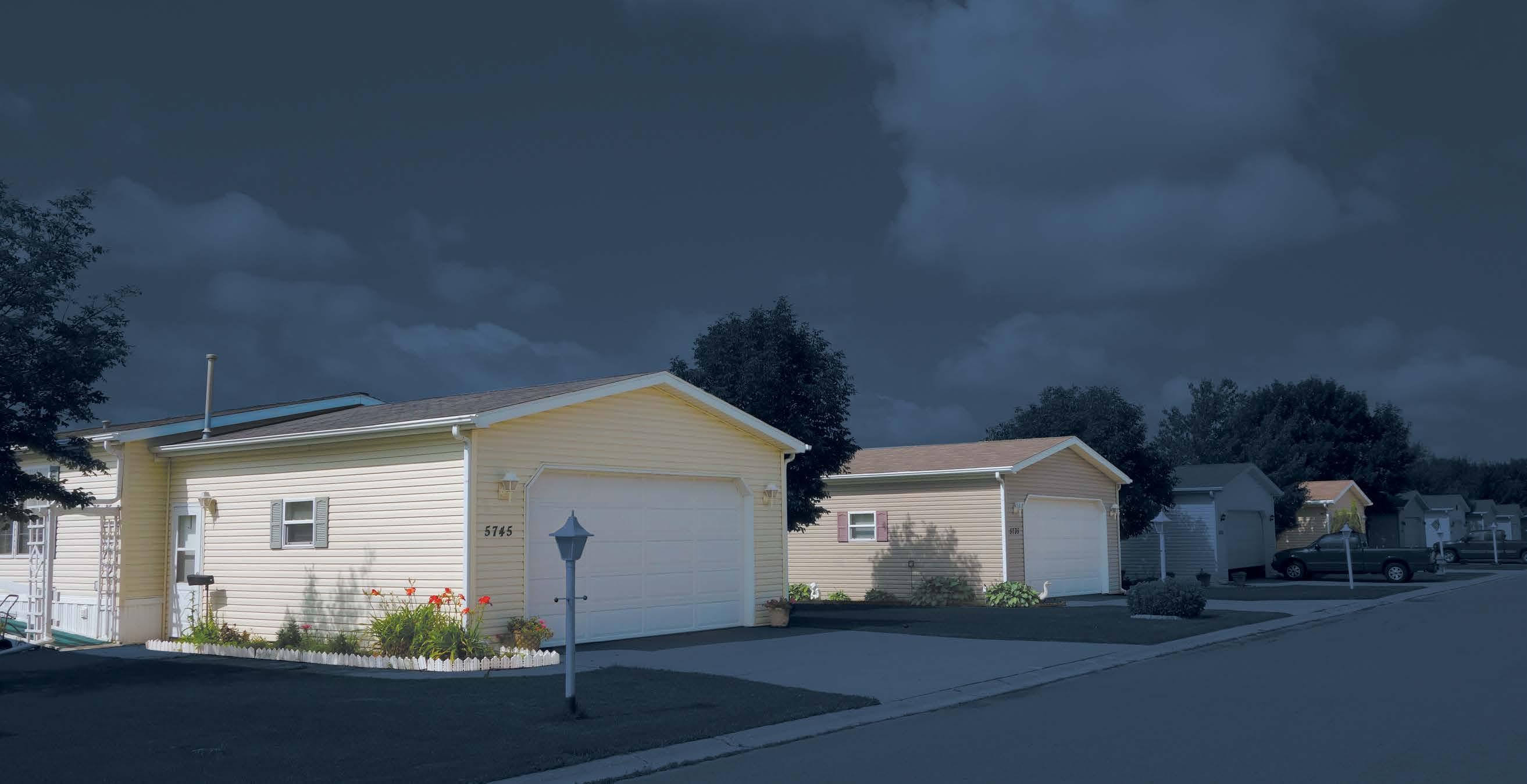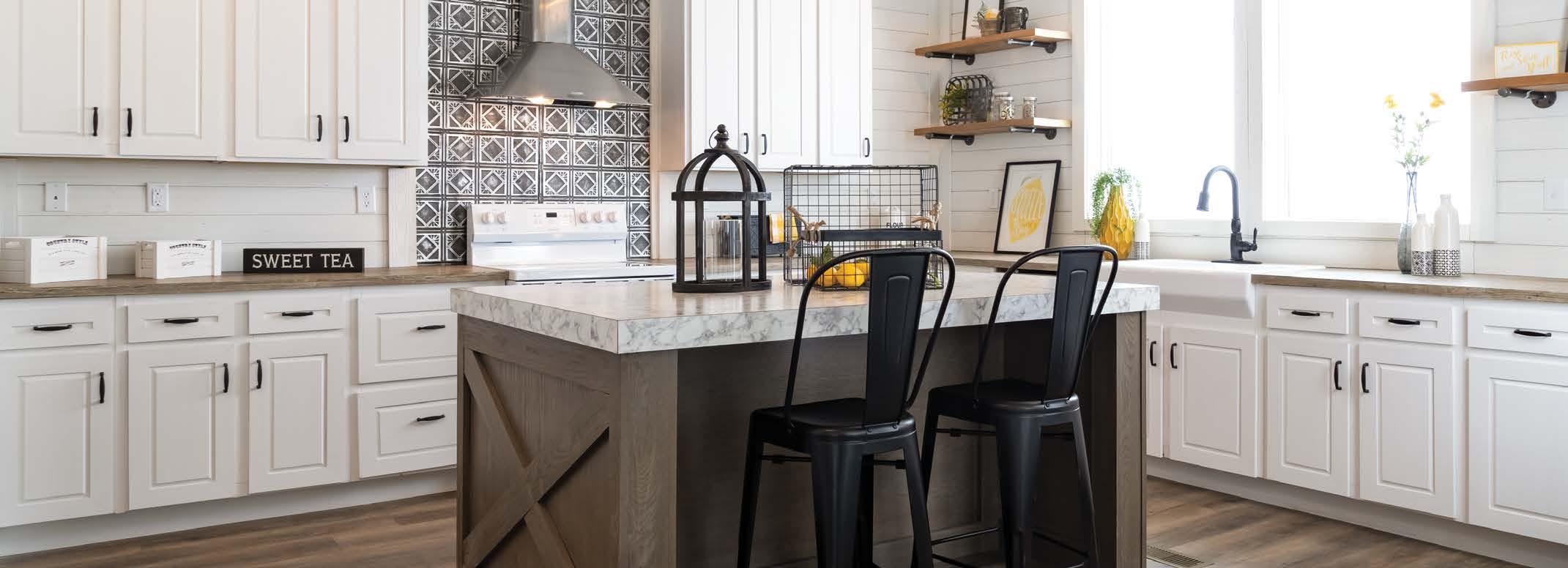
17 minute read
Looking Beyond 2020 - Seizing the Moment to Help Grow the Market
LOOKING BEYOND 2020
Seizing the Moment to Help Grow the Market
by Dr. Lesli Gooch
As the nation continues to emerge from the unprecedented economic and social upheavals in 2020, the need for more affordable homeownership options has emerged as a critical priority of policymakers in Washington. The Manufactured Housing Institute is working in Washington to position the industry to support the nationwide demand for affordable homeownership. This includes ensuring American homebuyers have the opportunity choose the quality home that fits their needs and budget and ensuring that financing is available to support the purchase of manufactured homes.
MHI’s work to update the U.S. Department of Housing and Urban Development’s manufactured housing regulations and financing programs for manufactured homes has never been more important. During the pandemic, President Trump signed an executive order »
granting emergency authority to agencies to expedite the rulemaking process for reforming regulations in an effort to provide American businesses a foothold as the economy recovers from COVID-19. As part of MHI’s ongoing advocacy efforts, we are urging HUD to utilize the opportunity this order presents to: ensure the Federal Housing Administration’s financing programs support consumers interested in financing the purchase of manufactured housing; finalize necessary updates to the federal manufactured housing construction and safety standards; create a more streamlined process for updating the HUD Code; and strengthen HUD’s efforts when it comes to state and local zoning practices and policies.
Achieving Steady Progress in Washington
MHI has made steady progress in a divided Washington to support the industry through effective advocacy that tells the positive story of the manufactured housing industry. HUD Secretary Ben Carson and his team have prioritized manufactured housing as a critical unsubsidized affordable housing option. MHI is encouraged by the progress that HUD has made to change the regulatory landscape for manufactured housing. HUD is finally making changes to our federal building code to support even greater innovations and efficiencies in our homes. The administration is also looking at ways to eliminate regulatory barriers at the state and local level that limit the placement of affordable housing in communities where they are needed most. It has maintained progress to make government-sponsored financing programs available for today’s manufactured homes that will support more Americans becoming homeowners.
Ensuring FHA’s Programs Support Financing for Manufactured Housing
The economic impact of this unprecedented national health crisis makes access to FHA financing programs more critical than ever. As such, MHI is advocating for these programs to be updated so they are available for con
www.rocusa.org

ROC USA is Now Serving California
When it’s time to sell your park, call ROC USA®. We’ve helped more than 250 owners in 21 states with a proven exit strategy that’s effective and efficient. We’re paid by the buyers: the homeowners living in your park. Call (603) 545-1704 today for a confidential conversation.
sumers seeking homeownership through manufactured housing. While updates to both the Title I (personal property) and Title II (land-home) programs have been needed for some time, updates to the FHA program to accommodate manufactured housing financing is particularly important as the industry launches its new class of CrossMod™ homes. While Fannie Mae and Freddie Mac have developed financing programs for CrossMod Homes, FHA’s rules and procedures have not been appropriately modernized to accommodate these types of homes. MHI was pleased that HUD’s September 2019 Housing Finance Reform Plan to President Trump supported innovations in manufactured housing, including a statement that: “FHA should consider innovative proposals to modify single-family housing mortgage finance underwriting to further encourage and promote additional supply of entry-level housing, particularly manufactured housing.” This is precisely what is needed. With COVID-19’s exacerbation of affordable housing supply and affordability challenges, MHI is advocating for the FHA to act quickly to modernize its policies to support CrossMod homes.
Finalizing Updates to the HUD Code
Under the leadership of HUD Secretary Ben Carson, HUD’s approach to the regulation of manufactured homes has changed, ensuring the industry can support the American Dream of homeownership for more people. The administration recognized early on that because the HUD Code had not been updated in decades and because regulatory oversight had become an impediment to cost and innovation, it was increasingly difficult for manufactured home builders to offer consumers the latest innovations, technologies, and features. President Trump’s Executive Order “Establishing a White House Council on Eliminating Regulatory Barriers to Affordable Housing” specifically referenced manufactured housing as an area that had been previously hindered due to “outdated manufactured housing regulations and restrictions.”
At the direction of Secretary Carson, HUD’s Office of Manufactured Housing Programs has completely changed its approach to the oversight of manufactured home production, which had been increasing costs, slowing production lines, and limiting innovation. HUD’s policies and regulations over manufactured housing have been comprehensively reviewed and HUD has proposed the first changes to the federal building code for manufactured homes in nearly a decade. The Code has not been so broadly or substantially updated in years and the revisions represent critical progress in clearing out the backlog of recommendations previously approved by the Manufactured Housing Consensus Committee pending final HUD approval and implementation. Changes include new standards for attached garages, carports, decks, and accessory buildings.
In addition to clearing out the decades-old backlog, MHI is advocating for HUD to develop and implement a streamlined process for updating the HUD Code, so that future revisions are implemented regularly. While the HUD Code has brought standardization to the industry, in order for manufactured housing to achieve its full potential in addressing the affordable housing needs of the nation, it is important to ensure manufactured housing regulations stay current with today’s technologies. MHI has argued that since HUD is the standard-setting body for the nation’s manufactured home construction and safety standards, updates should follow a distinct »
administrative path and be prioritized separately from unrelated policy matters. Secretary Carson has repeatedly affirmed HUD’s commitment to streamlining the administrative and regulatory processes that hinder innovation in manufactured housing. Such an approach was recommended by the Government Accountability Office in 2014 and again last year, by HUD’s own Office of Policy Development and Research. In addition, HUD’s September 2019 Housing Finance Reform Plan sent to the President embraced the recommendation from the GAO and PD&R, and called for HUD to “move to a regular cadence of updating its code to ensure that it is keeping pace with evolving technologies and best practices.” MHI is advocating for HUD to put a process in place where the Consensus Committee’s recommendations for updates to the code are implemented in a n a more timely way that is consistent with statutory directive.
Strengthening HUD’s Efforts on Local Zoning
Addressing local zoning and land planning ordinances that keep manufactured housing out of communities is also a top priority for MHI. Across the country, there are numerous examples of state and local zoning, planning, and development restrictions that either severely limit or outright prohibit the placement of a manufactured home. In 1997, under authority from the National Manufactured Housing Construction and Safety Standards Act, HUD issued its “Statement of Policy 1997-1 State and Local Zoning Determinations Involving HUD Code.” This policy statement summarizes HUD’s position concerning federal preemption and certain zoning and/or planning decisions made by state or local governments. In its statement, HUD clarifies, “if a locality is attempting to regulate and even exclude certain manufactured homes through zoning enforcement that is based solely on a construction and safety code different than that prescribed by the [National Manufactured Housing Construction and Safety Standards] Act, the locality is without authority to do so.”
The passage of the Manufactured Housing Improvement Act of 2000 significantly strengthened HUD’s preemption authority. The law explicitly states that the HUD Code has what is referred to as “supremacy” – that is, that localities have no authority to establish construction or safety standards for manufactured homes that deviate from the HUD Code. Unfortunately, there are still localities that do not follow this statutory rule and try to establish different standards, sometimes with the goal of creating barriers to siting manufactured homes in their community.
MHI is advocating for HUD to exercise its preemption authority when local construction regulations or zoning, planning, or development policies adversely affect the placement of manufactured housing. While HUD has pursued individual cases where local jurisdictions have introduced construction and safety standards that are not

consistent with the HUD Code or have imposed zoning and planning requirements that exclude HUD-compliant manufactured homes, MHI has called on HUD to have a much greater role in this effort according to its congressional mandate. MHI has asked HUD to update its “Statement of Policy 1997-.’ MHI is also calling on HUD to take action to ensure that localities understand and comply with the supremacy of the HUD Code for manufactured housing – such as issuing strong guidance, or binding or enforceable rules that clearly state this important statutory provision.
MHI’s advocacy is gaining traction among the nation’s leaders. In its annual report to the President, the White House Council of Economic Advisers stated that manufactured housing regulations are among the excessive regulatory barriers imposed by state and local governments that create higher housing prices and lower housing supply. In HUD’s Housing Finance Reform Proposal, Secretary Carson called for greater utilization and enforcement of HUD’s preemption authority. In addition, during a conference call with Vice President Mike Pence in April to discuss the housing needs of the nation during the pandemic, Secretary Carson reaffirmed HUD’s commitment to addressing state and local barriers to the siting of manufactured housing and said that manufactured housing is making a “big difference” in addressing the affordable housing shortage in the country, which he assured call participants remains a “huge” priority for HUD. Secretary Carson said he hopes to see an increase in the number of families choosing manufactured homes given the great value they provide at an attainable price point. The secretary concluded his remarks about manufactured housing by telling MHI, “You keep making the good stuff and we’ll be in good shape.”
Conclusion
As the country emerges from the COVID-19 emergency, many potential homebuyers are going to be looking for safe, affordable housing that allows them their own space, free of shared-walls and cramped quarters. Ensuring these vulnerable families have access to quality manufactured housing has never been more important. By advancing updates to government-sponsored financing programs and allowing our industry to provide home buyers with the innovations, technologies, and features they desire, HUD can galvanize its pledge to facilitate the availability of affordable manufactured homes and to increase homeownership for all Americans.
MHI will continue to advocate for federal housing policy to support increased access to manufactured housing. As your national trade association, MHI is committed to ensuring our industry has the regulatory environment to thrive and create even more opportunities for homebuyers to realize the American dream of homeownership.
If you have any questions, please contact MHI’s Advocacy and Communications Department atMHIgov@mfghome.org or 703-558-0675. MHV
Dr. Lesli Gooch is the CEO of the Manufactured Housing Institute, the national trade organization representing all aspects of the factory-built housing industries.
announcement

Educate MHC SAVE THE DATE N etworking Roundtable nasHville, tn July 7-9, 2021 educateMHc.coM
Community-Owned Home Condition Rating: Excellent Market Value: $67,468 Community-Owned Home Condition Rating: Fair Market Value: $41,259

What is Your Portfolio of Homes Worth in Today’s Market?
• Determine an accurate value of housing assets for sale, purchase, or lending decisions
• Identify a fair market purchase price for retail or rental home inventory
• Discover loan-to-value ratios and overall worth of housing assets
• Flexible solutions customized to your unique needs
• Market-based approach for the most accurate representation of value
• Over 30 years of industry experience
Determination of Collateral Value for Chattel Portfolios Large and Small
Whether you’re looking to purchase a property with community-owned homes or rental inventory, or acquire a portfolio of loans, Datacomp’s valuation services can provide you the data you need to make informed decisions. Our experienced team of manufactured housing appraisers specializes in determining an accurate worth of housing portfolio assets utilizing our proven market-based approach to value, based on each customer’s unique needs. Our detailed reports provide the information you need to take the next step in your transaction with confidence and peace of mind.
NO BUYER LEFT BEHIND
It’s like auto-remind for your loan application. We alert you when your credit score improves.
Simply inquire digitally & if your credit score does not allow for an approval, we will monitor it for a year & let you know when you may be able to qualify!


INQUIRE NOW
CREDIT MONITORING DOES NOT REQUIRE ADDITIONAL CREDIT INQUIRIES AND HAS NO IMPACT ON THE CONSUMER’S CREDIT SCORE. THIS SERVICE IS OFFERED AT NO CHARGE TO CONSUMERS WHO INQUIRE THROUGH ASK-CADE.COM. ALL LOANS ARE SUBJECT TO CREDIT AND PROPERTY APPROVAL. NOT ALL BORROWERS MAY QUALIFY FOR THESE TERMS. PROGRAM TERMS AND CONDITIONS ARE SUBJECT TO CHANGE WITHOUT NOTICE. NOT ALL PRODUCTS ARE AVAILABLE IN ALL STATES OR
FOR ALL LOAN AMOUNTS. OTHER RESTRICTIONS AND LIMITATIONS APPLY. Southwest Stage Funding, LLC dba Cascade Financial Services (licensed and dba as Cascade Land Home Financing in WA, OR, PA,and DE), 2701 E. Ryan Road #150, Chandler, AZ 85286, (877) 869-7082, NMLS #89599(www.nmlsconsumeraccess.org) Equal Housing Lender. Mortgage Lender License Information in: AL #21156, AR #103432, AZ #0904764, CA #4130836 Licensed by the Department of Business Oversight under the California Residential Mortgage Lending Act, CA #60DBO79436 Loans made or arranged pursuant to a California Finance Lender Law license, CO #89599 Regulated by CO Division of Real Estate, CT #ML-89599 & MS-89599, DC #MLB89599, DE #011888, FL #MLD978,Georgia Mortgage Lender Licensee, License #31581, ID #MBL-8421, IL #MB.6850003 Illinois Residential Mortgage Licensee, IN #15632, IA #MBK-2012-0107, KS #MC.0025086 Kansas-Mortgage Company License, KY #MC73414, LA #89599, MD #06-20056, ME #SLM12305, MI #FR0020576, MO#17-2305-M,MS #89599 Licensed by Mississippi Department of Banking and Consumer Finance, MT # 89599,NC #L-152241, NE #89599, Nevada Mortgage Broker License #4892, NH #21916-MB, ND #MB103030, NM #01875, OH #MBMB.850145.000, OK # ML011108, OR Mortgage Lending License #ML-4674, PA #33954 Licensed by PA Dept. of Banking, RI#20173500LL Rhode Island Lender License, SC #MLS-89599, SD #ML.04967, TN#110368, TX #89599, Licensed by Virginia State Corporation Commission Lender License #MC-5544, NMLS ID #89599 (www.nmlsconsumeraccess.org), VT #7154and 7155, WA #CL-89599, WV #ML30833, WI #89599BA, WY #MBL-2922.
and consolidation of individual communities into property portfolios (e.g. Recall REIT wavelet of the mid-1990s. J. Wiley & Sons, New York publishers, produced two case bound texts supplying detailed information on these trending topics: “Development, Marketing & Operation of Manufactured Home Communities” of 1994, and “How to Find, Buy, Manage & Sell a Manufactured Home Community” in 1996. First printings of both books sold out within six months of release. Now-retired David Alley and Edward Hicks were two of three authors penning the first text; dozens of writers contributed to the second tome.
Finance education, in this industry observer’s opinion, has long been an Achilles’ heel of the manufactured housing industry and and-lease communities. Thanks to Tony Petosa, Nick Bertino, Erik Edwards, and Matt Herskowitz of Wells Fargo, since year 2006, they’ve continually updated their comprehensive, and highly popular, “Manufactured Home Community Finance Handbook” – having to do with real estate secured mortgages for this type investment property. Four years later, the “Manufactured Housing $ PRIMER” debuted – and quickly sold out, at MHI’s annual Manufactured Housing Congress in Las Vegas. The primer showcased nearly 30 knowledgeable contributors, and covered chattel capital in a fashion never done so before! Today, it is out of print; and the perennial topic, chattel capital, goes begging for exposure.
To show how far we’ve come in the knowledge arena, as an industry and realty asset class there have been several books published with sharp foci. One, “Land Lease Communities, Manufactured Home Communities, Mobile Home Parks, Trailer Courts & Camps, and Affordable Housing” (2011) leaves no stone unturned relative to this unique income-producing property type. And the 2012 “Book of Formulae, Rules of Thumb & Helpful Measures” describes, and ’splains every mathematical that applies to communities. It even includes a description and example of the community valuation tool, the New Rule of 72 – exclusively unique to the realty asset class!
Let’s end Part II with a review of the history books authored to date about the industry and property type. The late Dr. Carl Edwards researched and wrote about “mobile homes” from 1932 through 1993. He was a professor at Michigan State University, Cornell, and Syracuse. He wrote and self-published “Homes for Travel and Living” in 1977. Then Allan D. Wallis appeared on the MH scene, in 1991, with his classic “Wheel Estates: The Rise and Decline of Mobile Homes”. There’s been no sequel. However, in 2013, former MHI executive Bruce Savage wrote “The First 20 Years!” to commemorate the debut, and two decades of growth, of national advocacy, on behalf of 50,000 land-lease communities nationwide! Then, during 2014, freelance writer Bob Vahsholtz published his deeply researched magnus opus, DUELING CURVES, The Battle for Housing”. While it has more to do with factory-built housing overall, than manufactured housing per se, it pulled key historical events, pioneers, companies, and product advances together for study and reflection.
And finally, in 2017, came “SWAN SONG”, ostensibly a history of land-lease communities from 1970 to the present day, and the first published official record of manufactured housing shipments from 1955 to the present day. So popular a new release, the initial printing sold out within 30 days, and a new edition/printing appeared during year 2018. Bottom line? This was, and continues to be, the first and only comprehensive history of the realty asset class!
So, where does one find – to buy – these aforementioned titles (i.e. the ones still in print)? Two locations: the RV/MH Heritage Foundation’s Hall of Fame, Museum & Library in Elkhart, IN. (574) 293-2344. And via EducateMHC at their website: www.educatemhc.com
Finally. Do you have a manufactured housing- or community-focused book you’d like us to review, and possibly write about in this Allen Legacy column? If so, talk to me about it via gfa7156@aol.com or mail a review copy to GFA c/o EducateMHC 170 Commerce Dr., Franklin, IN. 46131. MHV
George Allen has owned and fee-managed land-lease communities since 1978. He’s a former MHI Industry Person of the Year and a member of the RV/MH Hall of Fame. He has been designated a Certified Property Manager-Emeritus and a Manufactured Housing Manager-Master. He’s also a senior consultant and staff writer with EducateMHC. Allen can be reached at (317) 346-7156 and gfa7156@aol.com.
Photo courtesy of Clayton Homes

Tracing Manufactured Housing & Community History Through the Authors
Part II: 1990 – 2020
by George Allen, CPM Emeritus, MHM-Master
Part I of this column scratched the surface of the first published historical record, relative to manufactured housing and communities. That’s because, in large part, there were so few industry and realty asset class pioneers who took time and made the effort to share their specialized knowledge and experiences. Today is much different. Part II takes us well beyond the seven businessmen introduced earlier.
By way of review, “Managing Mobile Home Parks” was not the first book authored on that subject. During 1988, the book was self-published; and, during the next 32 years went through eight edition updates and three title changes. Today it’s marketed by the Institute of Real Estate Management as “Community Management in the Manufactured Housing Industry”. It is also the core text of the Manufactured Housing Manager™ professional property management training and certification program administered by EducateMHC, and taught by two of the text’s three co-authors, Susan McCarty, MHM, and Erin Smith, MHM.
Another “carry over”, nearly parallel to Gary Pomeroy’s home sales classic of the last century, is the “Guidebook for Selling & Seller-financing New Manufactured Homes On-site in Land Lease Communities” of 2016. This text, authored by Adriane DeRose, Richard Ernst, Jamie Dougherty, Ken Rishel, Spencer Roane, and Pamela Ziemer (all MHMs except Ernst & Rishel), embodies the 21st Century paradigm shift, where distribution of new HUD-Code housing units has moved away from independent (street) MHRetailers into land-lease communities nationwide. The book is precedent-setting, introducing Four Steps to Selling & Financing New Homes On-site, and Six Right Ps of Marketing applied to manufactured housing and communities.
The 1990s saw two significant community trends emerge: developing raw land into and-lease communities,










